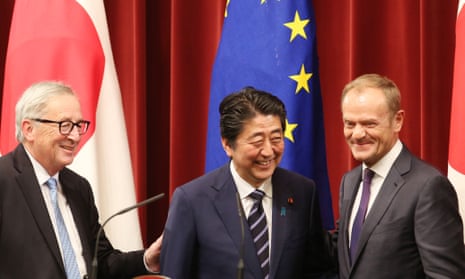The EU and Japan say approval of the world’s largest bilateral free trade deal shines a “light in the darkness” of global political uncertainty. Japan’s prime minister, Shinzo Abe, and the EU leaders Donald Tusk and Jean-Claude Juncker sought to establish themselves as the flag-bearers of the free world, in response to Donald Trump’s show of apparent solidarity with Vladimir Putin in Helsinki on Monday.
The leaders promoted the benefits of a free trade deal that is set to eliminate nearly all tariffs on products traded between Japan and the EU.
Tusk, the president of the European council and an outspoken critic of the Trump administration in recent months, was particularly keen to celebrate the shared values of the signatories, not only in terms of trade but also foreign policy.
Coming just 24 hours after Trump backed the Russian president over his own intelligence services at a summit in the Finnish capital, Tusk pointedly highlighted the continued support of Japan and the EU for the territorial integrity of Ukraine, whose Crimean peninsula was illegally annexed by Russia in 2014.
Tusk said Japan and the EU were firm in their support of the Iran nuclear deal, the joint comprehensive plan of action, which lifted economic sanctions on Iran in return for curbs on Tehran’s nuclear expansion. Trump reneged on the deal earlier this year.
Tusk said: “Politically, it’s a light in the increasing darkness of international politics. We are sending a clear message that you can count on us. We are predictable – both Japan and [the] EU – predictable and responsible and will come to the defence of a world order based on rules, freedom and transparency and common sense. And this political dimension is even more visible today, tomorrow, than two months ago and I am absolutely sure you know what I mean.”
He continued: “Let me say that today is a good day not only for all the Japanese and Europeans but for all reasonable people of this world who believe in mutual respect and cooperation ...We are putting in place the largest bilateral trade deal ever. This is an act of enormous strategic importance for the rules-based international order, at a time when some are questioning this order.”
Asked how he would respond to concerns that free trade could threaten jobs, Tusk responded: “Political uncertainty, tariff wars, excessive rhetoric, unpredictability, irresponsibility; they are a real risks for our businesses, not trade agreements.”
Trump has been condemned at home and abroad after failing to denounce Russian meddling in the US presidential election during a joint press conference with Putin, during which he appeared to side with the Kremlin over his own intelligence services. The Republican senator John McCain has claimed that “no prior president has ever abased himself more abjectly before a tyrant”.
Abe, an early visitor to Trump’s Mar a Lago resort after his election, did not address the Helsinki summit directly but told reporters that the trade agreement with Brussels “shows the world the unshaken political will of Japan and the EU to lead the world as the champions of free trade at a time when protectionism has spread”.
Juncker, the president of the European commission, added: “As far as we are concerned there is no protection in protectionism, and there is no unity where there is unilateralism.”
The commission has announced that Juncker will visit Washington and meet Trump at the White House next Wednesday to discuss trade.
Once ratified by parliaments on both sides, the EU-Japan trade deal will eliminate about 99% of tariffs on Japanese goods, including on cars, from the eighth year after the deal is implemented, with tariffs scrapped on car parts immediately.
Japanese consumers will enjoy lower prices for European wines, pork, handbags and pharmaceuticals, should it come into force in 2019, as is expected. The two parties also signed an agreement to allow data to flow between the EU and Japan, creating “the world’s largest area of safe data flows”.









